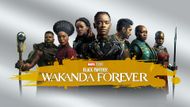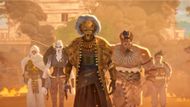Black Panther is way more than the linchpin of the Marvel Cinematic Universe (MCU). It is a cultural phenomenon that shook everything far beyond the confines of superhero media. If you want to discuss its current position, we have to zoom back to the character's creation, the OG comic roots. Then we will need to race through the movies, their impact on pop culture, and most importantly, sheer devastation with Chadwick Boseman's passing and Black Panther: Wakanda Forever.
Black Panther appeared on the scene back in 1966, created by writer-editor Stan Lee and artist Jack Kirby for Marvel Comics. He showed up in Fantastic Four #52. T'Challa, king of Wakanda, wasn’t just your average cape-wearing hero — he was the very first Black superhero in mainstream American comics. And this wasn’t just a random move, given that the Civil Rights Movement was still echoing in America, and here comes Wakanda — a high-tech African nation that never got stomped on by colonizers. Black Panther, hence, became a symbol for Black excellence and Afrofuturism.
His comic book story has been all over the place when it comes to politics — identity, leadership, tradition vs progress, and conflict between isolationism. And Wakanda turned into more than just a backdrop: The colonialism-free sci-fi paradise, dripping with insane technology, magic metal, and ancient traditions. Then the MCU came along and just blew it wide open. Black Panther went from niche comic legend to global icon, almost overnight.
Chadwick Boseman kicked off his run as Black Panther in 2016’s Captain America: Civil War, and he just owned it. He gave the character new gravitas — he could be stoic one minute, then show this real warmth and a kind of quiet pain the next. When Black Panther dropped in 2018, it pretty much changed the game. You had this massive, worldwide buzz, and for the first time, a superhero movie rocked a mostly Black cast and crew. It was widely acclaimed for its Afrofuturist design, diasporic inquiry, and multidimensional antagonist (Erik Killmonger).
Then, Boseman's passing away in 2020 just hit everyone — fans were gutted, obviously, but Marvel had a narrative gamble on their hands. What do you even do when your lead is gone? The franchise did not swap in a new T’Challa for Black Panther: Wakanda Forever. That choice shook up the fanbase. It made everybody actually sit with the grief, the legacy, and what it really means to have a Black superhero at the heart of these big stories.
Comic roots of Black Panther

So before getting into movies, let’s talk about the comic book stuff that came first:
Firstly, T’Challa is juggling being a king and saving the world. He is dodging political backstabbing at home while fighting off everything from colonial conquerors and cosmic beings.
And the comics aren’t just a one-note superhero romp. We have key writers like Christopher Priest, Reginald Hudlin, and Ta-Nehisi Coates taking turns at the wheel. Priest dials up the political intrigue, Hudlin leans into Black power and pride, and Coates will have you questioning the entire history of Africa and the U.S.
Then there is Wakanda. People love to call it “isolationist,” but when you are sitting on a mountain of vibranium and everyone wants a piece, you would lock your doors too. Additionally, there are all those spiritual components (the Panther God Bast), which are the backbone of the whole story.
So, before Marvel Studios even touched a camera, Black Panther’s world was already deep.
Phase I: Black Panther’s MCU debut and formation

Captain America: Civil War (2016):
In Civil War, T’Challa bursts onto the scene as Wakanda’s Crown Prince. His father, King T’Chaka, gets killed at the UN bombing, and T’Challa is instantly out for blood. He is hell bent on taking down the Winter Soldier (Bucky), thinking he is the guy behind it.
The movie wastes no time showing off how this guy operates: Super intense, but not some mindless revenge machine. He has got technological prowess, and he has advanced combat skills. But even after all that rage, when T’Challa finally gets his hands on the real villain, Zemo, he shows restraint. That moment lays the groundwork for the kind of king he becomes in Black Panther (2018).
Black Panther (2018):
Ryan Coogler’s Black Panther blends super-powered action and some real-deal social commentary. When T’Chaka bites the dust, T’Challa has to step up as king. Soon, he is thrown into old-school ritual battles such as facing off against M'Baku of the Jabari clan, to prove he is not just a king, but The King.
But then, here comes Killmonger, aka Erik Stevens. He is the forgotten son of Wakanda. Growing up in America, scarred by loss and injustice, he has a burning vision: Flip Wakanda’s old-school rules and use all that vibranium to arm the oppressed and shake up the world order.
Things go off the rails as Wakanda has never seen a civil war before, but now it is Dora Milaje tradition vs. Killmonger’s squad. Half the crew — Nakia, Okoye, Shuri— rally to T'Challa's defense against Killmonger's tyranny. Eventually, T’Challa takes back the throne. But he has changed. Killmonger’s ideas stick with him. Next thing you know, Wakanda is setting up outreach centers in Oakland.
The movie shattered box-office records, grossing more than $1.3 billion globally. It became the first superhero movie ever to get a Best Picture nod at the Oscars. The internet went wild with #WakandaForever, cosplays everywhere, and Black and African youth finally seeing heroes who look like them.
Post-Black Panther developments:
After Black Panther dropped in 2018, Wakanda leveled up and started appearing in the rest of the Marvel movies. In Avengers: Infinity War, Wakanda turns into ground zero for the showdown with Thanos and his army. You get to see their tech in action, plus how they are not just some secret country — they are actually clutch when everything goes downhill.
Then, fast forward to Avengers: Endgame. T’Challa shows up with Okoye and the whole Wakandan squad for the final battle.
Phase II: Grief, succession, and expansion — Black Panther: Wakanda Forever (2022)

Marvel Studios had a tough situation on their hands after Chadwick Boseman died. Should they recast T'Challa in the story? Put together some CGI version? Or just blow up the whole story and start fresh? They picked the last one. Instead of pretending nothing happened, they went all in on the grief, power struggles, and resilience.
Right out of the gate, you are hit with Wakanda in deep mourning. T’Challa is gone — no cause given, which makes it feel more real, almost like Boseman’s real-life battle. So, Queen Ramonda takes over the throne, and she has got her hands full with France, US, and other outsiders drooling over vibranium. Practically, everyone is trying to rob Wakanda.
But the drama isn’t just coming from land. There is vibranium at the bottom of the Atlantic, which wakes up Talokan, an underwater nation led by Namor. Namor wants to team up and throw hands with the rest of the world. Wakanda declines, leading to war. Amidst all this, you get Riri Williams, an MIT genius, who built a vibranium detector, and she is being set up to become Ironheart.
Then there is Shuri. She is the tech brain of the country, but also just a daughter who lost her brother and is ready to burn the world down. She tries to bring back the Heart-Shaped Herb, and when she finally gets her trip to the Ancestral Plane, she gets confronted with Killmonger's ghost, who questions her ethics and motivations.
Eventually, Shuri creates a new herb, goes through the Black Panther ritual, and gets the suit. Her showdown with Namor is pretty stormy, but instead of smashing him, she learns something and calls a truce.
Meanwhile, M’Baku is sniffing out a shot at the throne. And over in Haiti, Nakia drops the bombshell that T’Challa had a secret son (Toussaint). Shuri replants the Heart-Shaped Herb, so Black Panther is not going anywhere.
Phase III: Seeding the future and speculation

Marvel seeded major expansion with Wakanda Forever. The introduction of Riri Williams/Ironheart lays groundwork for future Disney+ shows. This connection to Black Panther makes the MCU feel even more tangled.
Then there is Ayo, Okoye, and the Midnight Angels squad. The Dora Milaje aren’t just sidekicks anymore. You can tell Marvel’s itching to give them their own spotlight, maybe even a spin-off.
Toussaint, T’Challa had a secret kid twist, setting up a legacy arc down the road.
Now, about Eyes of Wakanda — this animated series is set to release in August 2025. It is not pushing the main story forward, but dives deep into that Wakandan lore, like ancient warriors, hazardous vibranium, and more.
Love movies? Try our Box Office Game and Movie Grid Game to test your film knowledge and have some fun!
